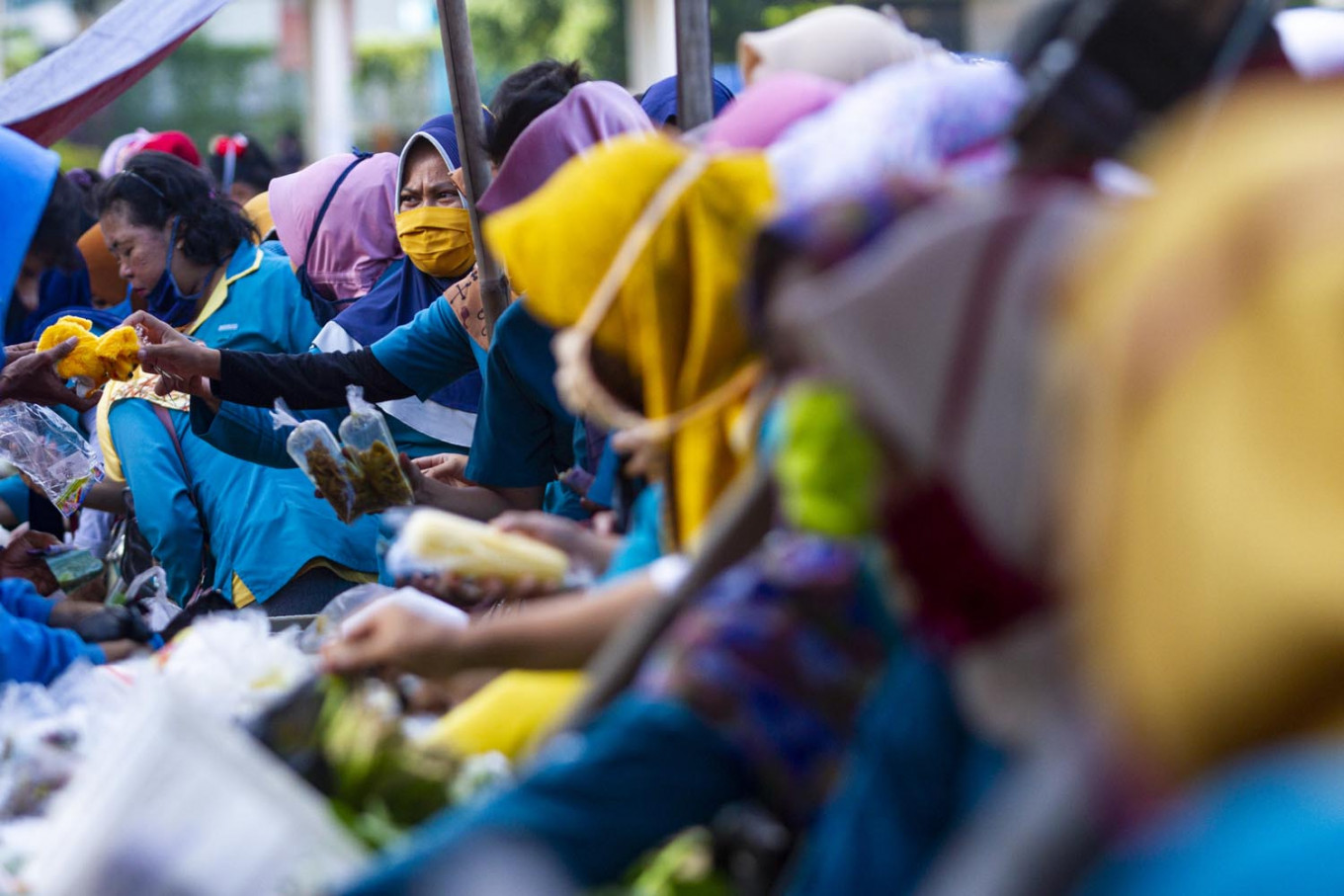Strong pandemic response, corruption eradication needed to attract investment: Experts
Investment Coordinating Board (BKPM) data show that foreign direct investment (FDI) realization fell by 6.9 percent year-on-year (yoy) in the second quarter to Rp 97.6 trillion (US$6.7 billion) as the pandemic hit the global economy.
Change Size
 A number of workers shop after completing their shifts near the Beesco factory in Karawang, West Java, on June 3. (Antara/M Ibnu Chazar)
A number of workers shop after completing their shifts near the Beesco factory in Karawang, West Java, on June 3. (Antara/M Ibnu Chazar)
T
o attract investment in the post-COVID-19 period, Indonesia needs to step up its handling of the pandemic to ensure the economy can be reopened safely and quickly and also strengthen its corruption eradication efforts, experts have said.
John Gardner, a former general counsel at the United States Agency for International Development (USAID), said Tuesday that how countries responded to the pandemic would be a consideration in investment decisions as the pandemic was changing how supply chains operated.
“I believe that how countries are responding to this pandemic will clearly be a part of future investment decisions,” he said in a virtual discussion.
“International investors want strong and effective responses to avoid production shutdowns, such as we saw in other countries in the region earlier this year,” he added.
President Joko “Jokowi” Widodo’s administration is pushing forward with the relaxation of pandemic restrictions to prevent bringing the economy to a complete standstill, despite rising numbers of COVID-19 infections.
According to official records, more than 116,700 people had caught the coronavirus as of Wednesday afternoon with around 73,800 recoveries and 5,452 deaths. The number of confirmed cases has increased by more than 1,000 per day since June after the government began it moves to reopen the economy.
Investment Coordinating Board (BKPM) data show that foreign direct investment (FDI) realization fell 6.9 percent year-on-year (yoy) in the second quarter to Rp 97.6 trillion (US$6.7 billion) as the pandemic hit the global economy. The figure reflects a continued downward trend for a second consecutive quarter.
Fadhil Hasan, a senior economist at the Institute for Development of Economics and Finance (Indef), said Tuesday the government needed to address corruption, inefficient government bureaucracy and improve access to financing to attract investment as the three issues were the most-concerning factors hindering investment.
“[Corruption] is the most concerning issue that we face in attracting investment, especially foreign direct investment,” said Fadhil. “So this is one of the areas that the Indonesian government has to tackle with respect to attracting foreign investment.”
Indonesia managed to improve its score in the Transparency International’s Corruption Perception Index (CPI) to 40 out of 100 last year, an increase of two points from 2018. The improvement put Indonesia in the 85th place out of 100 countries, climbing up from 89th place the previous year.
Fadhil added that the government should resolve the “different perceptions and interests among stakeholders” with regards to the omnibus bill on job creation, which is expected to improve Indonesia’s regulatory framework and attract investment in the post-COVID-19 era.
The government and the House of Representatives are deliberating the omnibus bill on job creation to revise 79 existing laws and more than 1,200 articles considered to hamper investment.
The government initially expected the House to complete the deliberations of the bill this month but the House’s Legislative Body (Baleg) expects it to take longer as lawmakers have not resolved half of the bill’s inventory problem list (DIM).
Meanwhile, the government is planning to develop an industrial park in Subang, West Java, in an effort to lure more investment into the country, said Muhammad Khayam, the director general of chemical, pharmaceutical and textile industries at the Industry Ministry during the discussion.
The BKPM recently announced investment commitments from seven companies relocating from China, one of which began construction in Subang in July.
According to the national mid-term development plan (RPJMN) for the 2020-2024 period, the government plans to develop 27 industrial parks, some of which have begun the construction phase.
Only two industrial parks are located in Java as the government seeks to place businesses closer to resources and raw materials and reduce regional disparities in development, according to Industry Minister Agus Gumiwang Kartasasmita.
The ministry also made efforts to prevent businesses from shutting down production completely during the pandemic by issuing operational permits that exempt them from the restrictions imposed by several regional administrations.
“We have issued these policies since the very beginning and we believe they have helped to prevent further declines in the economy,” Agus said in the discussion.









